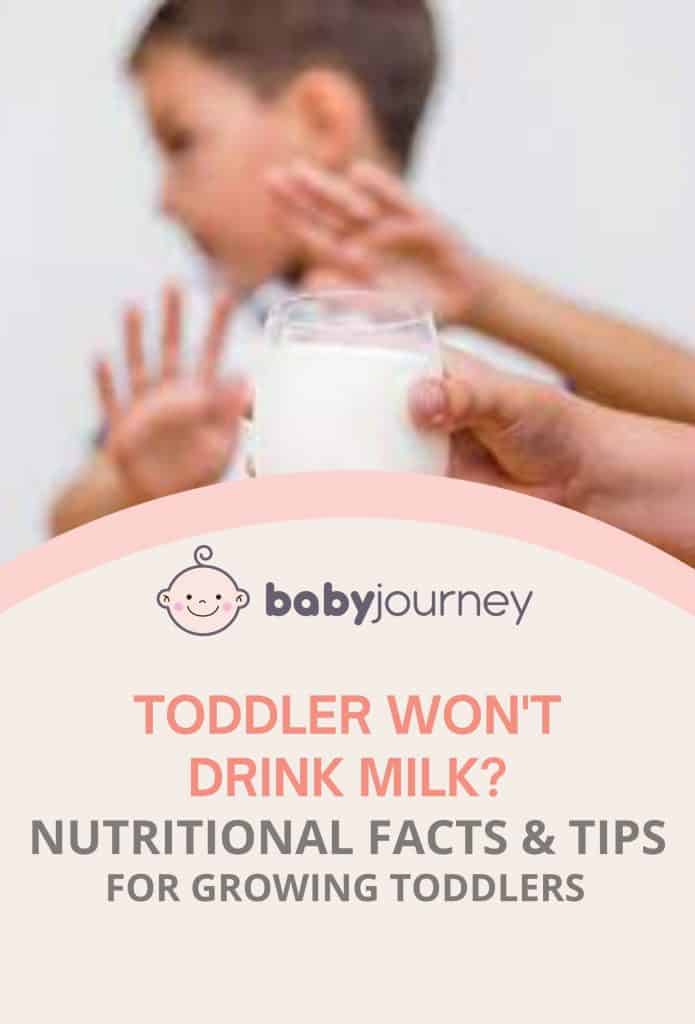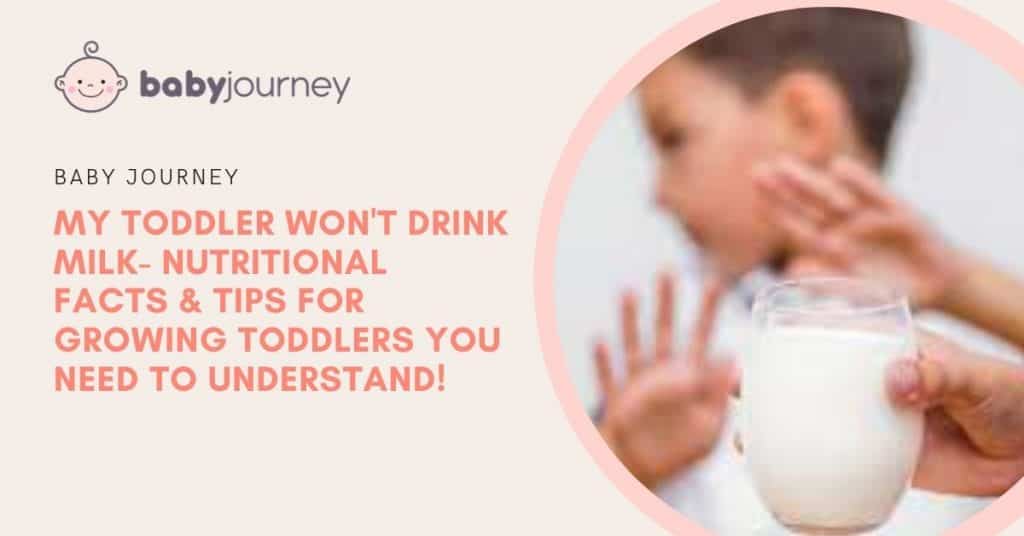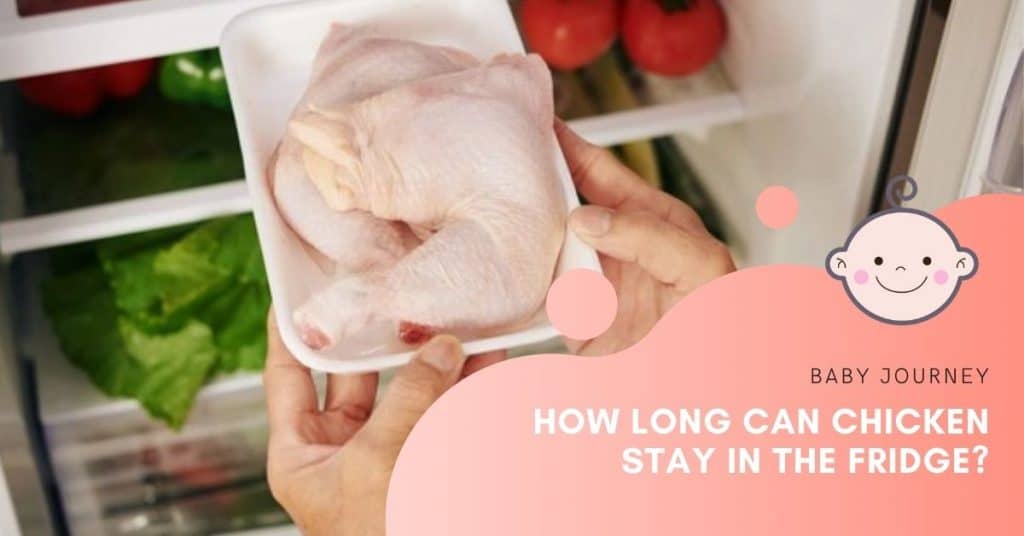I have been there. Sitting in the doctor’s office with my toddler and their pediatrician asks if they drink milk. I wish I could say yes, I know calcium is essential for developing children. But the truth is my toddler won’t drink milk.
We have tried other kinds of milk with some success. However, the fact that my toddler refuses milk on most days remains to be true. If you’re wondering how to get your baby to drink milk, we have a few suggestions! Hopefully, by the end of this guide, your toddler refusing to drink milk will be a thing of the past.
Why Won’t My Toddler Drink Milk?
Milk is an important component of a developing child’s diet. However, not all little ones like milk. Transitioning from breast milk or formula to cow’s milk can be a struggle.

Do Children Need Milk?
It isn’t so much the milk that children need but the calcium and vitamin D. These vitamins and minerals are essential for health and development.
Calcium is required to grow strong bones and teeth. Vitamin D also supports bone and teeth composition and growth. Milk and foods made with milk are children’s biggest sources of both calcium and Vitamin D. Therefore, consuming milk and milk products is usually a necessity for adequate nutrition. [1]
In addition to calcium and Vitamin D, milk contains many other nutrients such as:
- Protein for strong muscles and energy
- Calories and carbohydrates for energy and proper weight gain
- Magnesium for muscle, nervous system, and bone health
- Phosphorus for strong bones and a healthy heart
- Riboflavin for energy and red blood cells
- Vitamin B12 for nervous system health and red blood cell production
- Zinc for immune support
Milk is rich in vitamins and minerals, which is why drinking milk is recommended for children. [2]
Toddlers and Milk Aversion
If your toddler stopped drinking milk or you noticed that your 1 year old won’t drink milk right from the beginning, know that you’re not alone. A milk aversion in toddlers isn’t uncommon.
There may be a few reasons why your toddler doesn’t like milk.
The most common is that it is different from what they are used to. During the first year of life baby’s are fed breast milk or formula. Regular milk tastes different from both breast milk and formula. Additionally, milk is usually served cold whereas breast milk and formula are often warmed.
You may be interested in: Formula That Taste Like Breast Milk
Introducing milk is often a part of weaning. And so, your child may naturally be less receptive to drinking regular milk.
How Much Milk Should a Toddler Drink?
When your toddler’s not drinking milk you can’t help but wonder just how many glasses they’re missing out on. How much milk should a toddler drink? It isn’t black and white.
Toddlers’ milk intake is recommended to be limited to about 2-3 cups per day. However, measuring milk by the cups isn’t truly efficient. [3] What parents should focus on is how much calcium toddlers need each day; milk is just the most popular source.
How much calcium does a toddler need? Kids need about 500 to 1,300 milligrams of calcium each day depending on their age according to the American Academy of Pediatrics. [4] Milk is usually the easiest way to meet this quota. However, it isn’t impossible to get calcium from other food sources.
What Can I Do If My Toddler Won’t Drink Milk?
If your child isn’t fond of milk, there are a few tricks for how to get a baby to drink milk.
Playing Around with How Milk is Served!
You can vary the ways milk is served. The simplest tactic is to warm the milk. Some children may prefer warm milk as opposed to cold as it will more closely resemble their breast milk or formula.

If you are in the process of weaning you can try mixing breast milk and regular milk. This might mask the flavor enough. Once your child becomes accustomed to the taste you can slowly increase the amount of regular milk and decrease the breast milk.
Varying Toddler’s Diet!
Varying their diet can also help increase calcium and micronutrient intake. For example, 700 milligrams of calcium is equal to
- 1.5 cups of yogurt
- 3.5 ounces of hard cheese
- 3.8 cups of broccoli
- 3 cups of spinach
- 2.5 8-ounce glasses of fortified orange juice
- 8 ounces of Tofu
- 1 cup of fortified cereal
- 9 ounces of salmon
Mixing up your child’s diet can not only increase nutrition but decrease boredom and chances of food jag.
Trying Out Weight-bearing Exercises!
Calcium is essential for bone strength, but did you know that weight-bearing exercises can also help kids build strong bones? The following activities are great for bone health:
- Walking
- Running
- Jumping
- Jumping Rope
- Dancing
- Hiking
- Team Sports

Using a variety of methods while you try to encourage milk can help keep your little one’s bones strong and their calcium intake high.
What If My Toddler Is Lactose-Free?
Some children can’t have milk or dairy as they’re allergic to the proteins commonly found in cow’s milk. At first, it may be hard to tell if your child simply doesn’t like milk or if it is causing them digestive discomfort.
Instead of offering them a glass of milk, you can try offering other dairy products to test the water, such as cottage cheese or hard cheese. If they suffer from constipation, diarrhea, bloating, eczema, gas, or respiratory symptoms you may want to discuss the possibility of a dairy allergy with their doctor.
If your child suffers from lactose intolerance and is on a dairy-free diet, they can still meet their calcium quota. Remember, milk and dairy products aren’t the only sources of calcium though they do have the highest calcium content.

Milk alternatives that add calcium to your little one’s diet are not hard to come by. Good sources of calcium for toddlers that are dairy-free include:
- Oranges
- Canned salmon or sardines (with bones)
- Enriched soy milk or other plant-based milk
- Tofu
- Rhubarb
- Baby cereals and formulas
- Greens such as spinach, kale, and beets
- Fortified grains like cereal
- Dried figs
- Nuts & cooked beans (especially almonds and brazil nuts)
You can also consult with your kiddo’s pediatrician about a calcium supplement. Varying your little one’s diet and adding calcium-rich food sources will help support their bones and teeth sans dairy.
Milk Isn’t a Must But Calcium Is
“Help! My baby won’t drink milk” isn’t uncommon on parent forums and discussion groups. Some toddlers have a milk aversion while others have a dairy allergy. However, milk and dairy provide a valuable source of calcium and the problem shouldn’t be overlooked.
If your child won’t drink milk, try different strategies to encourage them. If they cannot drink milk or are working through their aversion, be sure to add lots of other calcium-rich foods to their diet! This will help support bone and teeth growth and development. If you’re still curious about anything, leave your questions in the comments! Hopefully, you found this article useful.
—




